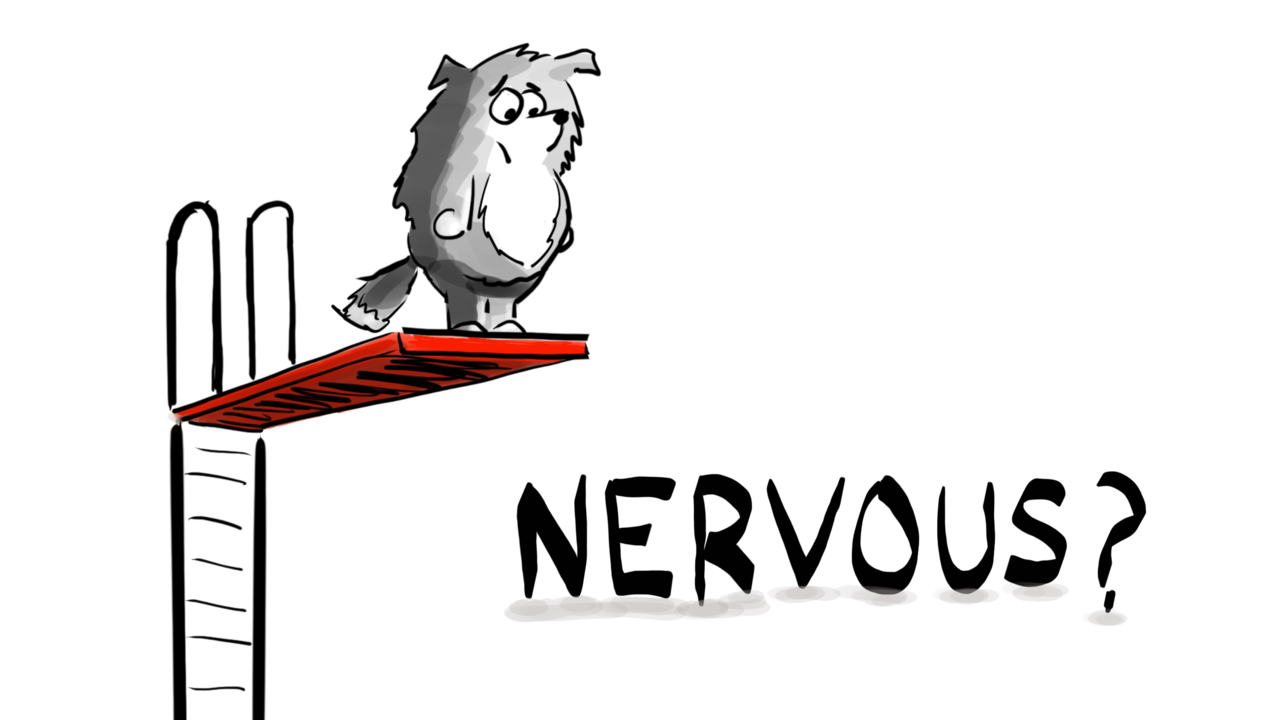One Easy Hack To Stop Your Nerves From Sabotaging You

"I think I'm going to be sick."
Have you ever felt so nervous you thought you might throw up?
I have.
Many times.
I've walked out onto the basketball court at the start of a national university championship wondering if my pre-game meal was going to reappear in front of a frenzied crowd. In dog agility, I went completely blank and forgot the course minutes before winning a world championship.
But I didn't realize I was doing something that was compounding my problem!
Here's the good news. Nerves don't have to be debilitating. Once I figured out this one small thing I was doing wrong, I was able to better control my symptoms.
You can learn how to manage your nervous symptoms too.
Which symptoms do you have?
Here's a little quiz for you...
When you are nervous, do you have any of these symptoms?
- Butterflies in your stomach?
- Heart beating faster?
- Faster respiration?
- Multiple bathroom trips?
- Maybe even feel a bit shaky?
Here's the thing...those are the same symptoms of EXCITEMENT.
But when you are nervous, there are some key differences...
- You perceive the situation as a threat instead of a CHALLENGE.
- You are focusing on your feelings instead of the important TASKS.
- Your physiological activation may be too high or too low (in real language you're too wound up or not wound up enough).
The result is your movements are jerky, you miss important information, your decision-making is poor, your reaction time is slow (or non-existent), and you have trouble connecting to the performance and finding your flow.
Now, just to be clear, a lot of factors—not just nerves— influence how smoothly you perform, or how good your reaction time is or, if you are in dog sport, even how well your dog performs.
Even if you are brilliant in training, you may not be able to reproduce that level of performance when it counts—if you can't get control of your nerves.
Control the chemicals
The thing to remember is this:
Nerves, like our emotions, are caused by chemicals that flood through our system, triggered by perceived threats around us.
But we can influence what chemicals are released into our system based on what we think and how we act, using various techiques.
Our mental state and our physiology influence each other.
Everyone feels nervous at times. Even Olympic and world champions. But the difference between them and you is they've learned techniques to help control their nerves, and even use their nerves to their advantage.
[Check out my Tame Your Trial Nerves Toolkit to learn 20+ useful nerve-busting techniques.]
Simple techniques, like proper breathing, can have a huge impact on your physiology—and your nerves.
My embarassing revelation
In fact, I ended up in the Emergency Room because I lost control of my breathing!
Years ago, I played in an important basketball game with a touch of the flu.
I played the entire game, and came off at the end feeling sick and exhausted. The world was spinning, the tips of my fingers tingled and I started to slur my speech. On the way to the ER, my hands when rigid, curling into frozen claws against my will.
I thought I was dying.
The ER doctor came in, checked me over and then said, "Relax. You're fine."
If I'd been able to, I'm might've jumped off the gurney I was lying on and attacked him. I was NOT fine and I wasn't going to relax.
Then he smiled and said, "You're hyperventilating."
😳
I'm not kidding. It's true.
It wasn't the obvious kind of wheezing, gasping for breath hyperventilating we typically think of, but a shallow, rapid breathing just subtle enough to lower my oxygen level and eventually send me to the ER.
The mind and body affect each other
Although I was already a strong believer in a good mental game, that day I became a convert about how simple things like breathing can have a massive impact on our physiology.
All the symptoms of nervousness—muscle tension, tingling, dizziness, lack of focus, slow motor muscle response— has been magnified exponentially by my poor breathing.
So take heart.
Simply being aware of your breathing is your first defense against nerves.
When you start to feel nervous, check your breathing, and take deep, diaphragmatic breaths to calm yourself down.
Want to learn more about proper breathing—and 20+ other tools—to fight off performance nerves?
Check out my TAME YOUR TRIAL NERVES TOOLKIT and get control of your nerves once and for all!
I want to improve my mental game!
Please send me the FREE 10-Part "Power Up Your Mental Game" course!
You can unsubscribe at any time.

